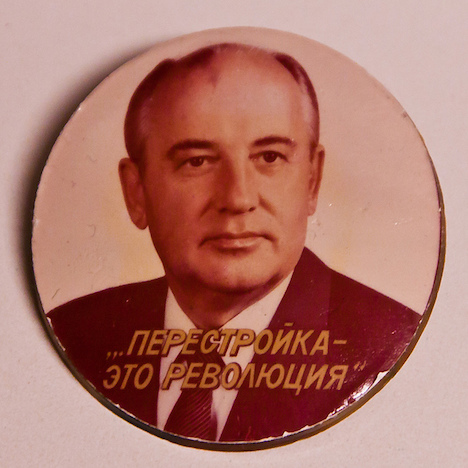|

|
Gorbachev Was Just Too Far Out Front of the US
 Print This Print This
By Russ Wellen, FPIF
Foreign Policy In Focus
Thursday, Mar 31, 2016
Mikhail Gorbachev exploded the Reagan administration’s little minds.
 |
| Many still believe that the United States won the Cold War and that nuclear weapons were the reason why. Pictured: Mikhail Gorbachev. (Photo: Dgies / Flickr Commons) |
Conventional thinking holds that nuclear deterrence helped the United States win the Cold War. Unfortunately, that may be doubly delusional. In their 1994 book We All Lost the Cold War (Princeton University Press), Richard Ned Lebow and Janice Gross Stein write:
The conventional wisdom has two components. American military capability and resolve allegedly convinced Soviet leaders that aggression anywhere would meet unyielding opposition. Forty years of arms competition also brought the Soviet economy to the edge of collapse. The Reagan buildup and Star Wars, the argument goes, were the straws that broke the Soviet camel’s back. Moscow could not match the increased level of American defense spending and accordingly chose to end the Cold War.
But …
Soviet officials insist that Gorbachev’s withdrawal of Soviet forces from Afghanistan, proposals for arms control, and domestic reforms took place despite the Reagan buildup. Mikhail Sergeyevich Gorbachev came to power in March 1985 committed to liberalizing the domestic political process at home and improving relations with the West so that the Soviet Union could modernize its rigid economy. Within a month of assuming office, he announced his first unilateral initiative — a temporary freeze on the deployment of Soviet intermediate-range missiles in Europe — and in a series of subsequent proposals tried to signal his interest in arms control.
Gorbachev’s motives?
Gorbachev came to office imbued with a sense of the urgency of domestic reform and with a fundamentally different attitude toward the West. He was confident that the United States would not deliberately attack the Soviet Union and that the serious risk was an accidental or miscalculated exchange. In conversations with his military advisors, he rejected any plans that were premised on a war with the United States. “During the period of stagnation,” he observed, “ we had assumed that such a war was possible, but when I became general secretary, I refused to consider any such plans.” Since he saw no threat of attack from the United States, Gorbachev was not “afraid” of any military programs put forward by the Reagan administration and did not feel forced to match them. Rather, he saw arms spending as an unnecessary and wasteful expenditure of scarce resources. Deep arms reductions were not only important to the reform and development of the Soviet economy, but also an imperative of the nuclear age.
Nevertheless …
President Reagan continued to speak of the Soviet Union as an “evil empire” and remained committed to his quest for a near-perfect ballistic-missile defense.
The Reagan administration couldn’t — or more accurately — didn’t want to pivot that quickly. Thus setting the table for the disappointment that was the Reykjavik summit in 1986.
Source URL
|
 Print This Print This

|
If you appreciated this article, please consider making a donation to Axis of Logic.
We do not use commercial advertising or corporate funding. We depend solely upon you,
the reader, to continue providing quality news and opinion on world affairs. Donate here
|
 |
World News

|

